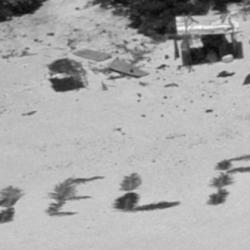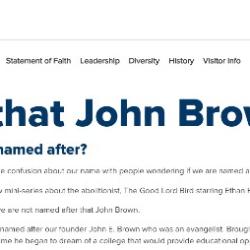I need to revisit “Shlock and Awwww: Commercializing Altruism” — Jon Mooallem’s conflicted appreciation of ABC television’s Extreme Makeover: Home Edition.
Mooallem’s summary of the show’s process is dead on:
“In charity,” Francis Bacon wrote, “there is no excess.” But then Bacon never saw Extreme Makeover: Home Edition, which since 2003 has been meting out garish and super-sized acts of charity — each more skillfully choreographed and excessive than the last — every Sunday night on ABC.
Each week, the reality show’s “design team,” led by cloying carpenter Ty Pennington, parks its tour bus at the dilapidated doorstep of a deserving, downtrodden family and unleashes a whopping assault of good will. …
The family is whisked off to Disney World and the design team begins demolishing its house and building a better one — fully landscaped and prominently decorated with brand-name appliances and furnishings supplied by Sears, Home Depot, and the show’s other sponsors — in one week.
I’ve just had an up-close look at that weeklong process as it unfolded on South Clayton Street in Wilmington, Del. We provided wall-to-wall coverage of every step of the way at the paper.1 Everything Mooallem captures about the experience of watching the show — the precisely calibrated sentimentality, the choreographed emotion, the misery inflation — is also present in the show’s production.
That last point, the misery inflation, is particularly troublesome. Mooallem describes it well:
Even infrequent viewers will notice how the show has tightened its stranglehold on our consciences by gradually inflating its misery quotient. While the first season featured a couple that needed a larger home for its (surprise!) triplets, only two seasons later we were deep into a gallery of woe: twins with leukemia, the mother of a little girl who wandered off to catch fireflies and disappeared forever. In a memo acquired by the Smoking Gun Web site, a producer asks the show’s casting agents to look for a kid with “congenital insensitivity to pain”: “There are 17 known cases in US, let me know if one is in your town!”
This is partly a result of the show’s strange origin and evolution. It is, as that colon in the title suggests, a spinoff from an earlier program called Extreme Makeover. That show began as a flagrantly exploitative bit of trash TV, following the silly and the shallow as they sought the most radical forms of plastic surgery, tummy-tucking and breast- and lip-augmenting themselves into unrecognizable parodies of the airbrushed, glossy ideals of beauty. Then, partly as an apology for its Midway freak-show tastelessness, the show turned to more “deserving” beneficiaries — children with cleft palettes palates and other deformities who actually needed the reconstructive surgery of an “extreme makeover.” This turned out to be more popular with viewers and thus the even-more popular spin-off was born, reconstructing houses instead of faces.
But the deeper reason for the escalation of the show’s “misery quotient” has more to do, I think, with the show’s essential problem: It provides gifts. Gifts are, by definition, not earned or paid for. For American audiences, that is a problem. If a family didn’t earn the gift, then why do they deserve it? Americans’ discomfort with such gifts is probably half Protestant work ethic2 and half deadly sin of envy. To ensure that the recipients of the show’s largesse are not resented, the show’s producers are desperate for ever-increasing levels of pathos. They’re racing to stay ahead of the wave of resentment always directed at the “undeserving poor.”3
The family selected in Wilmington fit the bill: virtuous, diligent and cheerfully struggling to provide for their children with special needs.
The “whopping assault of good will” Mooallem describes is impressive to behold up close. The show’s producers are very good at recruiting, coordinating and focusing the contributions of thousands of volunteers and dozens of corporate donors/sponsors. The “makeover” of the family home — actually its total replacement — was indeed extreme. The new, home was blitz-built in 106 hours by some 3,500 volunteers. It’s beautiful. The surrounding homes on the city block got a makeover too — new roofs and siding or paint. It’s all lovely.
The deluge of additional gifts to the family is also just as Mooallem describes:
Just like that, Makeover plucks poor or working-class people from their misfortunes and not only gives them a new Owens Corning roof over their heads, but — the implication is — newfound stability and comfort. Often the family also gets a new car, computers, or college scholarships for the kids. These changes can be profound. That Mississippi mom, reeling beside her new Ford Edge SUV while Pennington shouts, “It looks great, it’s fun to drive, and best of all it’s all yours!” mentions that she’s never owned a new car before. Suddenly we grasp the life-changing enormity of just giving her a reliable vehicle. But wait — here are an iPod, modern art, bicycles, a karaoke machine, Panasonic flat-screen TVs, a collection of African percussion for her son, and a spacious new storefront for her fledgling business. Plus, gospel singer CeCe Winans has turned up to raise the family a nest egg!
Here, from the paper, is a (partial) tally of the additional gifts bestowed by corporate donors yesterday on the family in Wilmington:
$125,000 to pay off the mortgage from ING Direct; four $25,000 savings accounts, one for each of Ju-Juanna Latif’s children, from Discover Bank; full tuition, room and board for three of the children from University of Delaware, upon admission; $3,600 raised during a family fundraiser at Kid Shelleen’s; a $1,000 gift certificate for steaks from Safeway Cargill; two pizzas a week for a year from Grotto Pizza; season tickets for life for the family … [for] the Wilmington Blue Rocks; cleaning services for one year from Pride Klean Inc.; free lifetime memberships for the children from Boys & Girls Clubs; free lifetime membership for the family from the YMCA; reading assistance for the children from Reading ASSIST Institute …
As with most corporate donations, this largesse is mainly a form of public relations — a way of investing in good will that can help to boost the bottom line. Local companies pitched in, in part, so that they could bask in the warmth of the saintly halo cast by this “whopping assault” and receive a share of the civic pride and gooey warm sensation generated by this media circus.
But this event also illustrates another motive that’s often a contributing factor in corporate contributions. All this giving became kind of infectious and even corporate executives can get caught up in it. The unspoken idea is something like, “Hey, look what we could do for this family.” There’s a sense that something real and profound and hopefully lasting could be achieved, if only for one particular family. Maybe we can’t solve all the problems of the city, or global poverty or world peace, but maybe we can transform the lives of these four kids. Even the executives from the notorious Delaware-based credit-card banks weren’t immune from the allure of that possibility.
The presence of ABC’s camera crews and its elaborately rehearsed and orchestrated whirlwind of altruism harnesses both of those motives — the cynical posturing and the fuzzier desire to have an impact — and is thereby able to bring to accomplish a dizzying amount in a week’s time.
What exactly has been accomplished, and what the long-term impact of it will be, is hard to say. It’s not something Extreme Makeover tracks. The show is a sprint, a blitz-build affair, not a marathon or a marriage. Mooallem notes that:
Several newspaper reports4 have exposed how some Makeover families wind up unprepared for their new, exponentially higher utility bills and property taxes. A blind New Jersey man with three disabled children and a $14,000 tax bill on his new abode told one paper, “With all the taxes, it’s like we’re on a chopping block.” Meanwhile, five siblings featured on an Easter Sunday 2005 episode recently sued their adoptive parents for driving them out of the nine-bedroom, six-bathroom house built for them. They also sued the show for rebroadcasting their episode knowing that its ending had soured. The kids’ attorney happily revealed to the Los Angeles Times that the show’s touching “door knock” scene, in which the design team first arrived at the house and dispensed hugs, took seven takes to shoot.
That accomplishment and that longer-term impact will depend, in large measure, on what this family and those four kids make of the opportunities they have been given. They will realize that too, and the pressure that brings will be a new kind of challenge for them, one the departing cameras aren’t going to assist them with. Yet still they’ve been given a shot, and that’s something.
I’d like to see ABC capitalize on the success of its Extreme Makeover franchise by testing the scope of this new tool it has created. I’d like to see them roll out Extreme Makeover: School Edition.
Pick a public school, an elementary school that’s struggling, underfunded and overwhelmed. The pool of potential candidates is large. Focus the cameras and the army of volunteers and corporate donors on that school for a week or two (maybe even a whole month, since schools are larger than homes) and see what might be accomplished. Picture the moistly congenial Pennington hugging the principal surrounded by the throng of adorable smiling children — it would be a ratings bonanza. (It’s worked out well for Oprah, after all.) Hey, kids, do you like your new computers? Your new music facilities and state-of-the-art cafeteria? Do you like the clean, well-lit hallways and the smartboards in every classroom? Do your teachers all like their new hybrid Ford Explorers? Wait, there’s more, the governor’s here to announce the new equitable funding system that means your education is no longer tied to the dwindling property-tax base of your declining neighborhood …
OK, that last bit is probably beyond the scope of what’s achievable here. That’s politics, and Extreme Makeover is resolutely a-political. It offers reforms of a more Dickensian sort — the kind that might be provided by a newly discovered Good Rich Uncle in the book’s final chapter. Dickens’ abrupt happy endings can often seem contrived and sentimental, just like Extreme Makeover, but the author loved his characters too much — and made readers love them too much — to begrudge them such a gift.
There are a lot of families, a lot of schoolchildren and schools and neighborhoods in America that could really use a Good Rich Uncle. Extreme Makeover might be the closest they’ll get to that.
– – – – – – – – – – – –
1 Which was, in its own way, impressive. I just wish I could think of more examples of such thorough and enthusiastic coverage for other subjects. Like maybe the elections, or the invasion and occupation of Iraq. I suppose with limited resources, we can’t cover every story this thoroughly, so we have to pick and choose, and the skilled PR people from ABC helped make this story easier to cover. There’s an echo in all of this of the satire from David Foster Wallace’s Infinite Jest. Wallace describes the slow death of television as it is supplanted by the Netflix-ish “Interlace cartridges,” with the dying medium inexorably forced to devote all of its attention and adspace to the new medium taking its place. The paper’s relentless enthusiasm for this visit from a television crew takes as a given that TV is more significant and more meaningful than the printed page or the paper’s Web site or, well, pretty much anything. That assumption is all the more disturbing when one realizes that the people assuming it can’t imagine any other possible way of looking at the world and that those same people are the ones running a newspaper.
2 Which arose, itself, in reaction to a theological system that emphasizes the seeming arbitrariness of grace. Calvin’s insistence that “salvation is grace, ethics is gratitude” morphed into a desperate attempt to demonstrate that we are deserving of grace while they are not.
3 I.e., poor, and therefore by definition undeserving. Panglossian nonsense if you think about it for even a moment, but this isn’t really a “thinking” response.
4 I hope that our paper will also do this kind of follow-up reporting down the road, long after the cameras have gone. Here, as always, it is a newspaper’s job to be skeptical, but that is different from being cynical. The task here is to separate the reality from the hype, but to do so without falling into the anti-hype that does nothing more than reflect and nurture the pre-existing resentment of any beneficiary of such a gift.5 Such reporting requires a powerful BS-detector, but if it indicates that the entire world is composed of 100 percent BS, then its sensors are defective and it needs to be recalibrated. I can’t find the passage just now, but C.S. Lewis talked about this in terms of illusion and disillusion — of the necessary discernment in life of “seeing through” illusion, while also remembering that the person who sees through everything lives in an invisible world no different from that of the blind.
5 See also the cycle of honeymoon and backlash with political candidates.
















